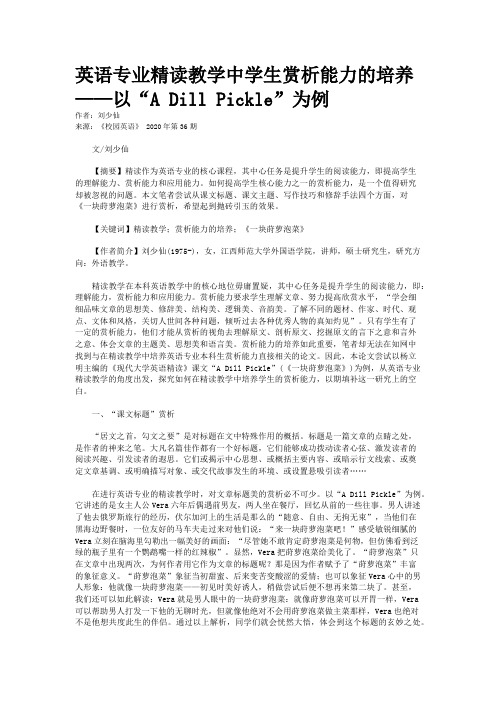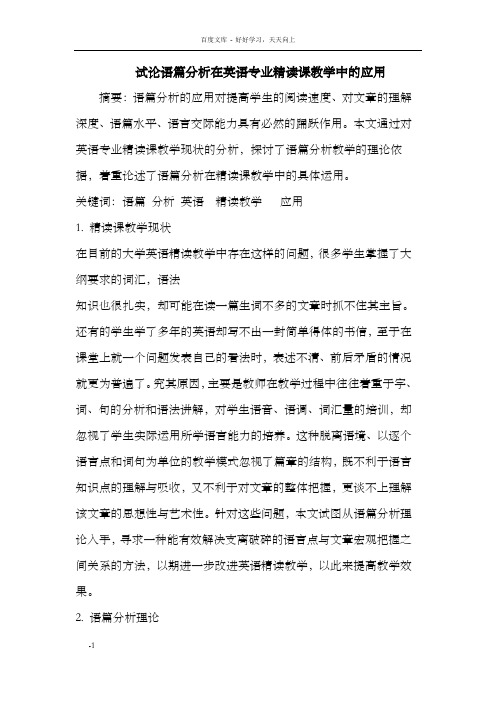大学英语专业精读分析解析共41页文档
英语专业精读教学中学生赏析能力的培养——以“A Dill Pickle”为例

英语专业精读教学中学生赏析能力的培养——以“A Dill Pickle”为例作者:刘少仙来源:《校园英语》 2020年第36期文/刘少仙【摘要】精读作为英语专业的核心课程,其中心任务是提升学生的阅读能力,即提高学生的理解能力、赏析能力和应用能力。
如何提高学生核心能力之一的赏析能力,是一个值得研究却被忽视的问题。
本文笔者尝试从课文标题、课文主题、写作技巧和修辞手法四个方面,对《一块莳萝泡菜》进行赏析,希望起到抛砖引玉的效果。
【关键词】精读教学;赏析能力的培养;《一块莳萝泡菜》【作者简介】刘少仙(1975-),女,江西师范大学外国语学院,讲师,硕士研究生,研究方向:外语教学。
精读教学在本科英语教学中的核心地位毋庸置疑,其中心任务是提升学生的阅读能力,即:理解能力,赏析能力和应用能力。
赏析能力要求学生理解文章、努力提高欣赏水平,“学会细细品味文章的思想美、修辞美、结构美、逻辑美、音韵美。
了解不同的题材、作家、时代、观点、文体和风格,关切人世间各种问题,倾听过去各种优秀人物的真知灼见”。
只有学生有了一定的赏析能力,他们才能从赏析的视角去理解原文、剖析原文、挖掘原文的言下之意和言外之意、体会文章的主题美、思想美和语言美。
赏析能力的培养如此重要,笔者却无法在知网中找到与在精读教学中培养英语专业本科生赏析能力直接相关的论文。
因此,本论文尝试以杨立明主编的《现代大学英语精读》课文“A Dill Pickle”(《一块莳萝泡菜》)为例,从英语专业精读教学的角度出发,探究如何在精读教学中培养学生的赏析能力,以期填补这一研究上的空白。
一、“课文标题”赏析“居文之首,勾文之要”是对标题在文中特殊作用的概括。
标题是一篇文章的点睛之处,是作者的神来之笔。
大凡名篇佳作都有一个好标题,它们能够成功拨动读者心弦、激发读者的阅读兴趣、引发读者的遐思。
它们或揭示中心思想、或概括主要内容、或暗示行文线索、或奠定文章基调、或明确描写对象、或交代故事发生的环境、或设置悬吸引读者……在进行英语专业的精读教学时,对文章标题美的赏析必不可少。
《现代大学英语精读(第二版)》教材分析

《现代大学英语精读(第二版)》教材分析【摘要】教材是教师进行教学活动的依据,也是学生学习的根本,而综合英语教材是英语专业教学最基本、最重要的内容。
《现代大学英语精读(第二版)》作为目前使用较广泛的专业英语教材,其重要性是不言而喻的,因此,对其进行综合的分析是必要的。
【关键词】《现代大学英语精读(第二版)》教材分析优点不足一、引言作为英语教学中最基本的因素,教材是开展教学活动的主要依据和学生学习的中心内容。
而对英语专业教学来说,综合英语教材更是重中之重。
因此,选用合适的精读教材对于精读课来说是至关重要的。
《现代大学英语精读(第二版)》是目前使用较为广泛的专业英语教材之一,因此,对其进行综合分析是十分必要的。
本文着重分析《现代大学英语精读(第二版)》这套教材的优点与不足之处。
二、对教材优点的分析1.题材广泛、内容丰富、主题深刻、语言优美《现代大学英语精读(第二版)》的文章都选自英美国家的原创文章,选材全面广泛,涉及西方社会、政治、经济、历史、文化等各个方面。
选材主题包括如下:学习态度(如Another School Year―What For?);家庭关系(如Message of the Land);人生感悟(如Half a Day);神话故事(如The Nightingale and the Rose);悬疑小说(如Midnight Visitor);历史灾难(如Pompeii);生态环保(如The Rite of Spring);生活轶事(如The Boy and the Bank Officer);人性探讨(如The Man in the Water);种族优越感(如Say Yes),等等。
此教材题材的广泛性和体裁的多样性体现了综合英语知识内容综合的特点,在很大程度上提高了学生的学习兴趣。
课文语言优美,写作手法多姿多彩,还大量运用了各种修辞手法,如比喻(明喻、隐喻)、借代、对照、夸张、讽喻等,使文章生动活泼,富有情趣。
disappearing through the sky line课文解析--大学英语专业精读

Company Logo
Part 1
(P.1—6)
(1)Science is accepted universally. (2)With the development of science, the difference and divergence have been narrowed down.
Company Logo
Company Logo
Part4
paras.16---19
This part takes the old-fashioned banks and the modern banks as examples to clarify the disappearing of history. Nothing is out of escape with the development.
• “disappearance” — nature, history, even the solid banks •universalizing tendency of science and technology •the modern man is universalized by a homogeneous world and becomes a cosmopolitan •a form of liberation resulting from the disappearance of history, “playfulness”
Company Logo
Eiffel Tower (La Tour Eiffel)
Company Logo
• built in 1889 in Champ-de-Mars(战神广场), • located in Paris, France. • named after its designer ------Alexandre Gustave Eiffel. 埃菲尔建议法国当局建造一座高度两倍于当时世 界上最高建筑物——胡夫金字塔、科隆大教堂和 乌尔姆大教堂的铁塔,并于1886年6月向1889年 博览会总委员会提交了图纸和计算结果,1887年1 月8日中标。 不过巴黎的文化人士听说这个计划之后马上 就发表了抗议信:“……该清楚地认识到我们在 追求什么了,该想象一下这个奇怪可笑的铁塔了。 它如同一个巨大的黑色的工厂烟囱,耸立在巴黎 的上空。这个庞然大物将会掩盖巴黎圣母院、残 疾人宫、凯旋门等著名的建筑物。这根由钢铁铆 接起来的丑陋的柱子将会给这座有着数百年气息 的古城投下令人厌恶的影子……‖
试论语篇分析在英语专业精读课教学中的应用

试论语篇分析在英语专业精读课教学中的应用摘要:语篇分析的应用对提高学生的阅读速度、对文章的理解深度、语篇水平、语言交际能力具有必然的踊跃作用。
本文通过对英语专业精读课教学现状的分析,探讨了语篇分析教学的理论依据,着重论述了语篇分析在精读课教学中的具体运用。
关键词:语篇分析英语精读教学应用1. 精读课教学现状在目前的大学英语精读教学中存在这样的问题,很多学生掌握了大纲要求的词汇,语法知识也很扎实,却可能在读一篇生词不多的文章时抓不住其主旨。
还有的学生学了多年的英语却写不出一封简单得体的书信,至于在课堂上就一个问题发表自己的看法时,表述不清、前后矛盾的情况就更为普遍了。
究其原因,主要是教师在教学过程中往往着重于字、词、句的分析和语法讲解,对学生语音、语调、词汇量的培训,却忽视了学生实际运用所学语言能力的培养。
这种脱离语境、以逐个语言点和词句为单位的教学模式忽视了篇章的结构,既不利于语言知识点的理解与吸收,又不利于对文章的整体把握,更谈不上理解该文章的思想性与艺术性。
针对这些问题,本文试图从语篇分析理论入手,寻求一种能有效解决支离破碎的语言点与文章宏观把握之间关系的方法,以期进一步改进英语精读教学,以此来提高教学效果。
2. 语篇分析理论黄国文教授认为:“语篇通常指一系列持续的话段或句子组成的语言整体。
语篇无论以何种形式出现,都必需合乎语法,而且语义连贯,包括与外界在语义上和语用上的连贯,也包括语篇内部在语言上的连贯。
”语篇分析是指对比句子更长,以交际为目的的对语言段落所作的语言及交际功能的分析,是从语篇的整体动身来分析解构整个篇章。
语篇分析以篇章为大体单位,从篇章的整体动身,先分析理解篇章结构,然后分析句子与句子之间,段落与段落之间的衔接及逻辑思维的连贯,从而使学生具有通览全篇的能力,掌握文章的主题,同时掌握句子在表达篇章整体意义上所起的作用。
3. 语篇分析在精读课教学中的具体运用文化背景知识的导入有助于进行语篇教学只有联系一篇文章所反映的政治、经济、历史、文化等背景知识,才能对该文章的主题即作者的写作意图、观点等做出正确的评价与反馈。
现代大学英语精读1课文分析

WB T L E
To be continued on the next page.
I. Text Analysis
Lesson 14 - After Twenty Years
Protagonists of the story
Jimmy:
Para. 2: the officer, with his strongly built form and slight air of superiority, made a fine picture of a guardian of the peace.
Protagonists of the story
Bob:
Para. 6: the light showed a pale, squarejawed face with keen eyes, and little white scar near his right eyebrow.
Para. 9: “TheWest is a pretty big place, and I kept running around over it pretty lively.”
WB T L E
The end of the Setting.
I. Text Analysis
Lesson 14 - After Twenty Years
Drama of the story
When they met again twenty years later, they should find themselves on opposite sides of the law—one was the man wanted by the police and the other turned out to be the police officer instructed to watch out for the runaway criminal. But no matter how much Jim had cherished their friendship, he would not let a personal relationship stand in the way of discharging his duty.
现代大学英语精读重点讲解

现代大学英语精读重点讲解现代大学英语精读重点讲解Beneath my clenched fingers the alder was wriggling like a small, frightened snake. My father saw that I was about to drop it."Hang on to it!"“The branch is squirming," I repeated. "And I hear something that sounds like a river!""Open your eyes," my father ordered.I was stunned, as though he'd awakened me while I was dreaming."What does it mean?" I asked my father."It means that underneath us, right here, there's a little freshwater spring. If we dig, we could drink from it. I've just taught you how to find a spring. It's something my own father taught me. It isn't something you learn in school. And it isn't useless: a man can get along without writing and arithmetic, but he can never get along without water."Much later, I discovered that my father was famous in the region because of what the people called his "gift": before digging a well they always consulted him; they would watch him prospecting the fields or the hills, eyes closed, hands clenched on the fork of an alder bough. Wherever my father stopped, they marked the ground; there they would dig; and there water would gush forth.Years passed; I went to other schools, saw other countries, I had children, I wrote some books and my poor father is lying in the earth where so many times he had found fresh water.One day someone began to make a film about my villageand its inhabitants, from whom I've stolen so many of the stories that I tell. With the film crew we went to see a farmer to capture the image of a sad man: his children didn't want to receive the inheritance he'd spent his whole life preparing for them—the finest farm in the area. While the technicians were getting cameras and microphones ready the farmer put his arm around my shoulders, saying:"I knew your father well.""Ah! I know. Everybody in the village knows each other... No one feels like an outsider.""You know what's under your feet?""Hell?" I asked, laughing."Under your feet there's a well. Before I dug I called in specialists from the Department of Agriculture; they did research, they analyzed shovelfuls of dirt; and they made a report where they said there wasn't any water on my land. With the family, the animals, the crops, I need water. When I saw that those specialists hadn't found any. I thought of your father and I asked him to come over. He didn't want to; I think he was pretty fed up with me because I'd asked those specialists instead of him. But finally came; he went and cut off a little branch, then he walked around for a while with his eyes shut; he stopped, he listened to something we couldn't hear and then he said to me: "Dig right here, there's enough water to get your whole flock drunk and drown your specialist besides." We dug and found water. Fine water that's never heard of pollution.The film people were ready; they called to me to take my place."I'm gonna show you something," said the farmer, keeping me back." You wait right here."He disappeared into a shack which he must have used to store things, then came back with a branch which he held out to me."I never throw nothing away; I kept the alder branch your father cut to find my water. I don't understand, it hasn't dried out."Moved as I touched the branch, kept out of I don't know what sense of piety—and which really wasn't dry—I had the feeling that my father was watching me over my shoulder; I closed my eyes and, standing above the spring my father had discovered, I waited for the branch to writhe, I hoped the sound of gushing water would rise to my ears.The alder stayed motionless in my hands and the water beneath the earth refused to sing.Somewhere along the roads I'd taken since the village of my childhood I had forgotten my father's knowledge."Don't feel sorry," said the man, thinking no doubt of his farm and his childhood; "nowadays fathers can't pass on anything to the next generation."And he took the alder branch from my hands.桤木树枝在我紧握的手指下扭动,如受惊的蛇一般。
大学英语专业精读【5】lesson2-textanalysis

structure
Part One (paras. 1-3) The mother and her hopes for her daughter.
Part Two (paras. 4-76)
The conflict between mother and daughter.
I imagined myself as different types of prodigy, trying to find out which one suited me the best
finding the queen of hearts in a deck of cards.
Put this into Chinese:
----You, Lady Queen, though, through fair you are, Snow White is fairer far to see.
Read Paragraph 19, and answer following questions: 1.What did the girl see in the mirror? 2.What new thoughts did she have now? What did she decide to do?
The girl had the sauciness of a Shirley Temple.
sauciness: impertinence; rudeness in an amusing way a Shirley Temple: of the Shirley Temple type.
The girl was Shirley Temple-like, slightly rude but in an amusing way.
大学英语精读第二册讲解

Abraham Lincoln (18
09-1865): the 16th pres
ident of the U. S. and a
republican. Born in Kent
二动词不定式的逻辑主语动词不定式所表示的动作的执行者与整个句子的主语不指同一人或物时需要在动词不定式前加上一个逻辑主语常用forsb
大学英语 精读 第二册
Unit2 Lessons from Jefferson
Lessons from Jefferson
Thomas Jefferson, the third President of the United States, may be less famous t han George Washington and Abraham Lincoln, but most people remember at least one fact about him: he wrote the Declaration of Independence.
Of all Jefferson's many talents, one is central. He was above all a good and tireless writer. His comp lete works, now being published for the first time, w ill fill more than fifty volumes. His talent as an au thor was soon discovered, and when the time came to w rite the Declaration of Independence at Philadelphia in 1776, the task of writing it was his. Millions hav e thrilled to his words: "We hold these truths to be self-evident, that all men are created equal ..."
